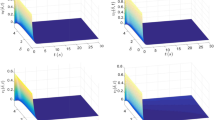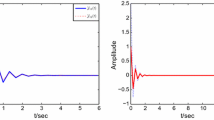Abstract
This work focuses on the extended dissipative synchronization control issue for reaction-diffusion genetic regulatory networks. The purpose of this paper is to design the sampled-data controllers that can meet the transmission requirement of networks and decrease the measure of the transmitted data signal. Furthermore, in order to take full advantage of actual sampling information, a Lyapunov–Krasovskii functional containing some sampled-instant-dependent terms is constructed. Then, sufficient conditions are derived, which guarantee that the error system satisfying extended dissipative performance index and the states of the system converge to zero asymptotically. Meanwhile, the desired sampled-data control gains are obtained by solving the convex optimization problem. Finally, a simulation example is provided to verify the established results.





Similar content being viewed by others
Explore related subjects
Discover the latest articles, news and stories from top researchers in related subjects.References
Ali MS, Gunasekaran N, Ahn CK et al (2018) Sampled-data stabilization for fuzzy genetic regulatory networks with leakage delays. IEEE/ACM Trans Comput Biol Bioinf 15(1):271–285
Chen W, Chen D, Hu J et al (2018) A sampled-data approach to robust \(H_{\infty }\) state estimation for genetic regulatory networks with random delays. Int J Control Autom 16(2):491–504
De Jong H (2002) Modeling and simulation of genetic regulatory systems: A literature review. J Comput Biol 9(1):67–103
Fridman E (2010) A refined input delay approach to sampled-data control. Automatica 46(2):421–427
Han Y, Zhang X, Wang Y (2015) Asymptotic stability criteria for genetic regulatory networks with time-varying delays and reaction-diffusion terms. Circuit Syst Sig Process 34(10):3161–3190
Hu J, Zhang H, Liu H et al (2021) A survey on sliding mode control for networked control systems. Int J Syst Sci 52(6):1129–1147
Hu J, Jia C, Yu H et al (2022) Dynamic event-triggered state estimation for nonlinear coupled output complex networks subject to innovation constraints. IEE/CAA J Automatica Sinica 9(5):941–944
Huang C, Zhang X, Lam HK et al (2020) Synchronization analysis for nonlinear complex networks with reaction-diffusion terms using fuzzy-model-based approach. IEEE Trans Fuzzy Syst 29:1530–1362
Liang X, Zhuo X, Wang R (2020) Global attractor of reaction-diffusion gene regulatory networks with S-Type delay. Neural Process Lett 51(2):1557–1577
Liu X, Xia J, Wang J et al (2021) Interval type-2 fuzzy passive filtering for nonlinear singularly perturbed PDT-switched systems and its application. J Syst Sci Complexity 34(6):2195–2218
Luo Q, Gong Y, Jia C (2017) Stability of gene regulatory networks with Lévy noise. Sci China Inf Sci 60(7):1–13
Manivannan R, Cao J, Chong KT (2020) Generalized dissipativity state estimation for genetic regulatory networks with interval time-delay signals and leakage delays. Commun Nonlinear Sci Numer Simul 89(105):326
Pandiselvi S, Raja R, Cao J et al (2019) Stabilization of switched stochastic genetic regulatory networks with leakage and impulsive effects. Neural Process Lett 49(2):593–610
Shen H, Huang X, Zhou J et al (2012) Global exponential estimates for uncertain Markovian jump neural networks with reaction-diffusion terms. Nonlinear Dyn 69(1):473–486
Shen H, Hu X, Wang J et al (2021) Non-fragile \(H_{\infty }\) synchronization for Markov jump singularly perturbed coupled neural networks subject to double-layer switching regulation. IEEE Trans Netw Learning Syst in press. https://doi.org/10.1109/TNNLS.2021.3107607
Shen H, Xing M, Yan H et al (2022) Observer-based \(l_2\)-\(l_{\infty }\) control for singularly perturbed semi-Markov jump systems with improved weighted TOD protocol. Sci China Inf Sci 65(9):1–2
Song X, Wang M, Song S et al (2021) Sampled-data state estimation of reaction diffusion genetic regulatory networks via space-dividing approaches. IEEE/ACM Trans Comput Biol Bioinf 18(2):718–730
Su L, Shen H (2015) Mixed \(H_{\infty }\)/passive synchronization for complex dynamical networks with sampled-data control. Appl Math Comput 259:931–942
Sun Q, Xiao M, Tao B (2018) Local bifurcation analysis of a fractional-order dynamic model of genetic regulatory networks with delays. Neural Process Lett 47(3):1285–1296
Syed Ali M, Vadivel R (2018) Decentralized event-triggered exponential stability for uncertain delayed genetic regulatory networks with Markov jump parameters and distributed delays. Neural Process Lett 47(3):1219–1252
Wang J, Tian L (2019) Stability of inertial neural network with time-varying delays via sampled-data control. Neural Process Lett 50(2):1123–1138
Wang J, Huang Z, Wu Z et al (2020) Extended dissipative control for singularly perturbed PDT switched systems and its application. IEEE Trans Circuits Syst I, Reg Papers 67(12):5281–5289
Wang J, Xia J, Shen H et al (2021) \(H_{\infty }\) synchronization for fuzzy Markov jump chaotic systems with piecewise-constant transition probabilities subject to PDT switching rule. IEEE Trans Fuzzy Syst 29(10):3082–3092
Wang J, Yang C, Xia J et al (2022) Observer-based sliding mode control for networked fuzzy singularly perturbed systems under weighted try-once-discard protocol. IEEE Trans Fuzzy Syst 30(6):1889–1899
Wang X, Park JH, Liu H et al (2021) Cooperative output-feedback secure control of distributed linear cyber-physical systems resist intermittent dos attacks. IEEE Trans Cybern 51(10):4924–4933
Wang X, Wang Z, Xia J et al (2021) Quantized sampled-data control for exponential stabilization of delayed complex-valued neural networks. Neural Process Lett 53(2):983–1000
Wang Y, Chen F, Zhuang G (2020) Dynamic event-based reliable dissipative asynchronous control for stochastic Markov jump systems with general conditional probabilities. Nonlinear Dyn 101(1):465–485
Wang Z, Lam J, Wei G et al (2008) Filtering for nonlinear genetic regulatory networks with stochastic disturbances. IEEE Trans Autom Control 53(10):2448–2457
Wang ZP, Wu HN, Wang JL et al (2020) Quantized sampled-data synchronization of delayed reaction-diffusion neural networks under spatially point measurements. IEEE Trans Cybern 51(12):5740–5751
Wu ZG, Shi P, Su H et al (2014) Exponential stabilization for sampled-data neural-network-based control systems. IEEE Trans Netw Learning Syst 25(12):2180–2190
Xie Y, Xiao L, Ge MF et al (2021) New results on global exponential stability of genetic regulatory networks with diffusion effect and time-varying hybrid delays. Neural Process Lett 53(6):3947–3963
Yang Z, Xu D (2007) Stability analysis and design of impulsive control systems with time delay. IEEE Trans Autom Control 52(8):1448–1454
Yao D, Li H, Shi Y (2022) Adaptive event-triggered sliding-mode control for consensus tracking of nonlinear multiagent systems with unknown perturbations. IEEE Transactions on Cybernetics in press. https://doi.org/10.1109/TCYB.2022.3172127
Yu W, Lu J, Chen G et al (2009) Estimating uncertain delayed genetic regulatory networks: An adaptive filtering approach. IEEE Trans Autom Control 54(4):892–897
Zhang B, Zheng WX, Xu S (2013) Filtering of Markovian jump delay systems based on a new performance index. IEEE Trans Circuits Syst I, Reg Papers 60(5):1250–1263
Zhang R, Zeng D, Park JH et al (2021) Fuzzy adaptive event-triggered sampled-data control for stabilization of T-S fuzzy memristive neural networks with reaction-diffusion terms. IEEE Trans Fuzzy Syst 29(7):1775–1785
Zhang X, Wu L, Zou J (2016) Globally asymptotic stability analysis for genetic regulatory networks with mixed delays: An M-matrix-based approach. IEEE/ACM Trans Comput Biol Bioinf 13(1):135–147
Zhang X, Han Y, Wu L et al (2018) State estimation for delayed genetic regulatory networks with reaction-diffusion terms. IEEE Trans Netw Learning Syst 29(2):299–309
Zhu JW, Gu CY, Ding SX et al (2021) A new observer-based cooperative fault-tolerant tracking control method with application to networked multiaxis motion control system. IEEE Trans Ind Electron 68(8):7422–7432
Zou C, Wang X (2020) Robust stability of delayed Markovian switching genetic regulatory networks with reaction-diffusion terms. Comput Math Appl 79(4):1150–1164
Zou C, Wei X, Zhang Q et al (2018) Passivity of reaction-diffusion genetic regulatory networks with time-varying delays. Neural Process Lett 47(3):1115–1132
Author information
Authors and Affiliations
Corresponding authors
Ethics declarations
Conflict of interest
The authors declare that they have no conflict of interest.
Additional information
Publisher's Note
Springer Nature remains neutral with regard to jurisdictional claims in published maps and institutional affiliations.
This work is supported by National Natural Science Foundation of China under Grant 61973199, 61873002, 61703004, by the Anhui Provincial Natural Science Foundation under grant 2208085QF202, by the Key Natural Science Foundation of Higher Education Institutions of Anhui Province under Grant KJ2021A0369, in part by the Open Fund of Key Laboratory of Anhui Higher Education Institutes under Grant CS2021-01.
Rights and permissions
Springer Nature or its licensor holds exclusive rights to this article under a publishing agreement with the author(s) or other rightsholder(s); author self-archiving of the accepted manuscript version of this article is solely governed by the terms of such publishing agreement and applicable law.
About this article
Cite this article
Qin, Y., Li, F., Wang, J. et al. Extended Dissipative Synchronization of Reaction–Diffusion Genetic Regulatory Networks Based on Sampled-data Control. Neural Process Lett 55, 3169–3183 (2023). https://doi.org/10.1007/s11063-022-11003-4
Accepted:
Published:
Issue Date:
DOI: https://doi.org/10.1007/s11063-022-11003-4




